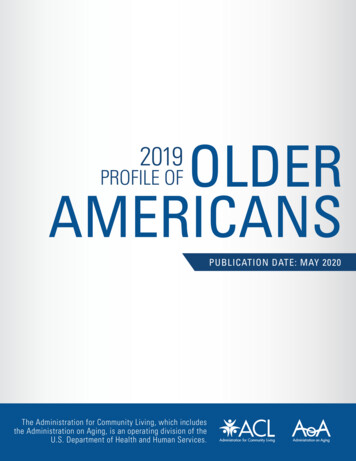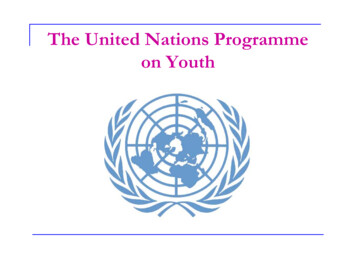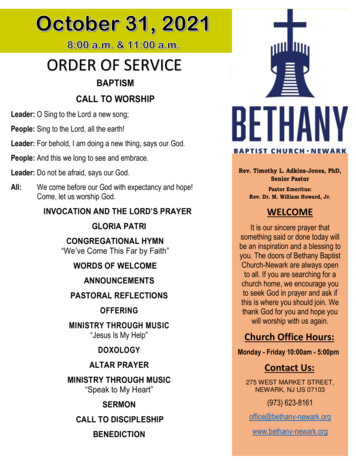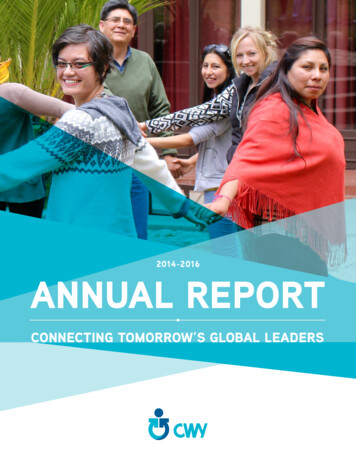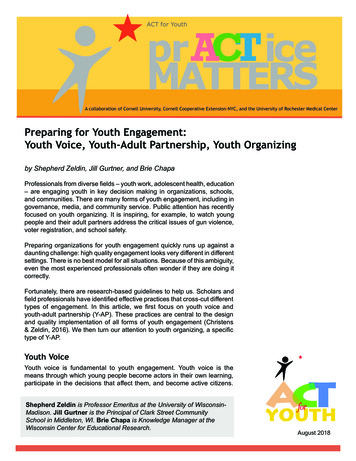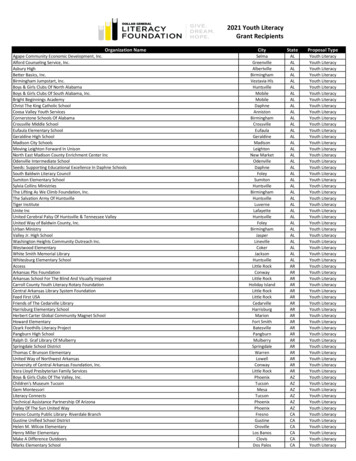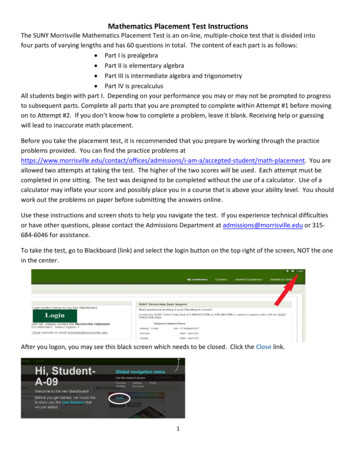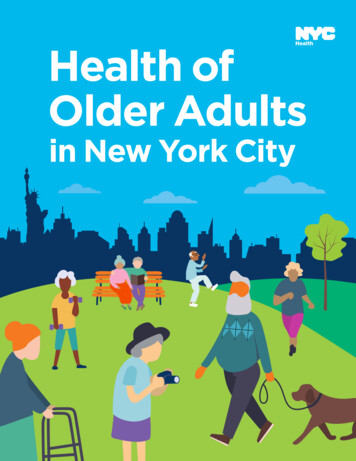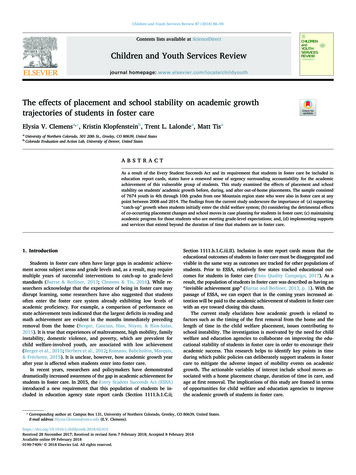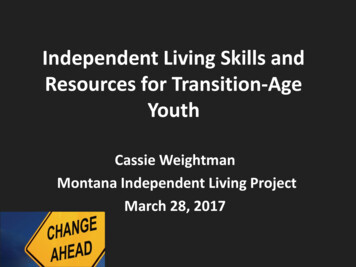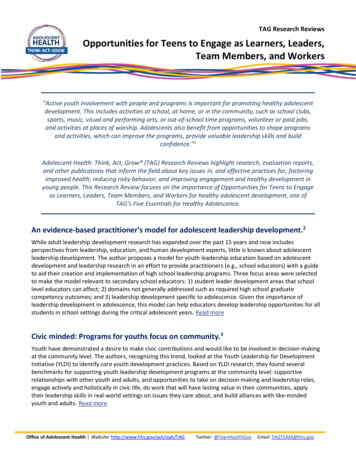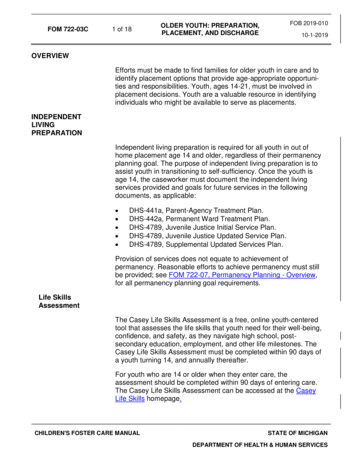
Transcription
FOM 722-03C1 of 18FOB 2019-010OLDER YOUTH: PREPARATION,PLACEMENT, AND DISCHARGE10-1-2019OVERVIEWEfforts must be made to find families for older youth in care and toidentify placement options that provide age-appropriate opportunities and responsibilities. Youth, ages 14-21, must be involved inplacement decisions. Youth are a valuable resource in identifyingindividuals who might be available to serve as placements.INDEPENDENTLIVINGPREPARATIONIndependent living preparation is required for all youth in out ofhome placement age 14 and older, regardless of their permanencyplanning goal. The purpose of independent living preparation is toassist youth in transitioning to self-sufficiency. Once the youth isage 14, the caseworker must document the independent livingservices provided and goals for future services in the followingdocuments, as applicable: DHS-441a, Parent-Agency Treatment Plan.DHS-442a, Permanent Ward Treatment Plan.DHS-4789, Juvenile Justice Initial Service Plan.DHS-4789, Juvenile Justice Updated Service Plan.DHS-4789, Supplemental Updated Services Plan.Provision of services does not equate to achievement ofpermanency. Reasonable efforts to achieve permanency must stillbe provided; see FOM 722-07, Permanency Planning - Overview,for all permanency planning goal requirements.Life SkillsAssessmentThe Casey Life Skills Assessment is a free, online youth-centeredtool that assesses the life skills that youth need for their well-being,confidence, and safety, as they navigate high school, postsecondary education, employment, and other life milestones. TheCasey Life Skills Assessment must be completed within 90 days ofa youth turning 14, and annually thereafter.For youth who are 14 or older when they enter care, theassessment should be completed within 90 days of entering care.The Casey Life Skills Assessment can be accessed at the CaseyLife Skills homepage.CHILDREN'S FOSTER CARE MANUALSTATE OF MICHIGANDEPARTMENT OF HEALTH & HUMAN SERVICES
FOM 722-03C2 of 18OLDER YOUTH: PREPARATION,PLACEMENT, AND DISCHARGEFOB 2019-01010-1-2019For youth who are placed in residential, it is the residential caseworker who ensures the Casey Life Skills Assessment if completed.If a youth is functioning at a level that the Casey Life SkillsAssessment cannot be utilized, the caseworker should identifyanother validated tool appropriate to the youth's functional needs,and request this be used by sending it to the Child Welfare PolicyBox or the Juvenile Justice Policy Box.Independent living preparation skills are assessed for each youthas being adequate or inadequate on the Child Assessment ofNeeds and Strengths or the Juvenile Justice Strength and NeedsAssessment see; FOM 722-08B, Foster Care - Child (Re)Assessment of Needs and StrengthsFor youth age 14 or older, a written description must be included inthe youth's treatment plan of the programs and services which willhelp the youth take care of oneself across all domains. Examples ofage appropriate services include, but are not limited to: Daily living skills.Preventive health services.Educational support.Employment services.Housing education/assistance.Mentoring - a youth must be connected to an adult who willguide and support him/her as a parent would after his/her caseis closed.Youth InvolvementTo prepare for independent living, the youth must be offered theopportunity to participate in quarterly family team meetings; seeFOM 722-06B, Family Team Meeting. Youth must be involved inthe development of his/her case service plan. The level ofinvolvement in the plan and the services provided are dependentupon the youth’s preference and developmental abilities.If a youth is unavailable or declines to sign or be involved in thedevelopment of the case service plan, the caseworker mustidentify, and document additional actions needed to secure theyouth’s participation in case service planning and implementation ofthe treatment plan.CHILDREN'S FOSTER CARE MANUALSTATE OF MICHIGANDEPARTMENT OF HEALTH & HUMAN SERVICES
FOM 722-03C3 of 18OLDER YOUTH: PREPARATION,PLACEMENT, AND DISCHARGEFOB 2019-01010-1-2019Case Plan TeamMembersBeginning at age 14, youth may select one or more adults who arenot the youth's foster parent/caregiver or caseworker, to be a partof his/her case planning team. The team members' role is to be theyouth’s advisor and advocate for his/her permanency, well-being,and normalcy through the application of the DHS-5307, Rights andResponsibilities of Children and Youth in Foster Care; see FOM722-06J, Rights of Children in Foster Care. The team member willassist the youth in developing his/her case plan by participating insemi-annual transition meetings, applicable family team meetings,and the 90-day discharge meeting; see FOM 722-06B, FamilyTeam Meeting.Note: The individuals selected by the youth may be denied at anytime if there is good cause to believe that the individual would notact in the best interest of the child. The caseworker must documentthe reasons for denying an individual chosen by the youth, in thecase service plan.Note: Youth who have a juvenile justice case and no foster carecase have no Family Team Meeting requirement.Caregiver’s RoleThe youth's caregiver is an invaluable resource regardingindependent living preparation, training in daily living skills,budgeting, and providing a support system for youth as theytransition out of the foster care or juvenile justice system. Thecaseworker must detail the activities that the caregiver will provideto assist the youth in the youth's treatment plan.INDEPENDENTLIVING PLACEMENTPlacement in independent living may be an acceptable livingarrangement for youth 16 years or older. Prior to placement inindependent living, the caseworker must assess the youth, with theCasey Life Skills Assessment, as being prepared for independentliving and demonstrate a pattern of mature decision making.CHILDREN'S FOSTER CARE MANUALSTATE OF MICHIGANDEPARTMENT OF HEALTH & HUMAN SERVICES
FOM 722-03C4 of 18OLDER YOUTH: PREPARATION,PLACEMENT, AND DISCHARGEFOB 2019-01010-1-2019Assessment andPreparation ofYouthIndependent living skills must be assessed for each youth as beingadequate or inadequate based on the Child Assessment of Needsand Strengths or the Juvenile Justice Strength and NeedsAssessment, and the Casey Life Skills Assessment. Provision ofindependent living services must be documented within the youth'sservice plan, as well as the plan for services for any independentliving need identified as inadequate.Independent LivingProgramStatementA copy of the supervising agency’s independent living programstatement must be given to the youth before placement in independent living.Independent LivingAgreementThe youth must be involved in the development of and sign the individualized independent living agreement. The DHS-4527,Independent Living Agreement must be reviewed and updatedquarterly. If no changes are required, the youth and the caseworkermust indicate that this review has occurred by re-signing and datingthe agreement. If changes are required, a new agreement must becompleted and approved.Supervisory ApprovalThe supervisor must review and approve, by signature, all initialand updated independent living agreements.Case Service PlanDocumentationWhen a youth resides in an independent living placement, the caseservice plan must document the following: The services provided and goals for future services that willhelp the youth maintain independent living successfully andprepare the youth for functional independence.CHILDREN'S FOSTER CARE MANUALSTATE OF MICHIGANDEPARTMENT OF HEALTH & HUMAN SERVICES
FOM 722-03C5 of 18OLDER YOUTH: PREPARATION,PLACEMENT, AND DISCHARGEFOB 2019-01010-1-2019 Independent living is the most appropriate placement for theyouth. The youth exhibits maturity in self-care and personaljudgement. The caseworker has personally observed that the livingsituation provides suitable social, emotional, and physical care. The youth has adequate financial support to meet his/herhousing, clothing, food, and miscellaneous needs. An evaluation of the youth's need for supervision. Thecaseworker must have face-to-face contact with the youth asdescribed in FOM 722-06H, Case Contacts, or JJ2 270, VisitRequirements. If the youth is a parent of a child who is 0 to 12 months old,safe sleep guidelines should be discussed. More informationcan be found at the MDHHS Safe Sleep for Infants webpage. The youth was provided with a phone number to contact theagency on a 24-hour, 7-day-a-week basis. The youth has a positive relationship with at least oneconsistent, reliable adult.CaseworkerResponsibilityCaseworkers maintain responsibility for monitoring youth in independent living placements. The same policy requirements thatapply to other foster care or juvenile justice cases apply to casesinvolving youth placed in independent living.Independent LivingStipendThe caseworker is required to provide reasonable efforts to assistthe youth in meeting the requirements of the independent livingagreement. Documentation of these efforts must be included in thecase service plan. If it becomes necessary to stop payment of thestipend as provided for in the agreement, the caseworker mustevaluate the continued adequacy of the youth’s living conditions. Itmay be necessary to explore other placement options.CHILDREN'S FOSTER CARE MANUALSTATE OF MICHIGANDEPARTMENT OF HEALTH & HUMAN SERVICES
FOM 722-03C6 of 18OLDER YOUTH: PREPARATION,PLACEMENT, AND DISCHARGEFOB 2019-01010-1-2019PLACEMENT IN ANADULT CAREFACILITYPlacement in an adult care facility may be considered for a youthunder the age of 18 if it is the most appropriate, least restrictivesetting. The Division of Child Welfare Licensing (DCWL) mayauthorize, through an exception process, placement in a licensedadult foster care family home or in a licensed adult foster care smallor medium group home. This would be allowable if the youth has adevelopmental disability, mental illness, or physical handicap thatlimits him/her to such a degree as to require complete physicalassistance with mobility and/or the activities of daily life.The supervising agency retains supervisory responsibility for anyyouth placed in an adult facility.Placement CriteriaThe placement must meet the following criteria: Is in the best interests of the youth. Has the approval of the youth's parent, guardian, or MCISuperintendent. Has the capacity to meet the youth's identified needs. The youth's psycho/social and clinical needs must becompatible with those of other residents. For juvenile justice youth, the placement must protectcommunity safety. The youth's level of cognitive functioning is consistent with thatof other residents.If approved, the caseworker will reevaluate the placement quarterlyto determine that these criteria continue to be met, and documentthis in the case service plan.Request forAuthorizationA request for authorization to place a youth who is less than 18years old in adult foster care must be submitted in writing to DCWLand Adult Foster Care and Home for the Aged Licensing DivisionCHILDREN'S FOSTER CARE MANUALSTATE OF MICHIGANDEPARTMENT OF HEALTH & HUMAN SERVICES
FOM 722-03C7 of 18FOB 2019-010OLDER YOUTH: PREPARATION,PLACEMENT, AND DISCHARGE10-1-2019(AFC/HA). The request must be signed by a supervisor from thesupervising agency. The request must contain the followinginformation: The name of the provider, the name of the facility and thelicense number must be included. The license number mustbegin with the prefix AF, AS, or AM. Information about the youth including:Name, date of birth and gender.A description of the youth’s psycho/social and clinicalneeds.The prescribed clinical treatment for the youth’s condition.A description of the youth’s cognitive level.A description of the youth’s developmental disability,mental illness, or physical disability.Medical documentation that the youth is physically limitedto such a degree as to require complete physicalassistance with mobility and activities of daily living.Any history of known trauma.An assessment of the youth’s immediate and long-termneed for foster care. Verification that the above placement criteria has been met.Review of RequestDCWL and the AFC/HA Licensing Division will review the requestand make a decision. The DCWL decision is final. A letter will besent to the supervising agency and the adult foster home indicatingapproval or denial of the request. Placement in the adult fosterhome must not occur without written approval from DCWL.CHILDREN'S FOSTER CARE MANUALSTATE OF MICHIGANDEPARTMENT OF HEALTH & HUMAN SERVICES
FOM 722-03C8 of 18OLDER YOUTH: PREPARATION,PLACEMENT, AND DISCHARGEFOB 2019-01010-1-2019SERVICES TOOLDER YOUTHYoung AdultVoluntary FosterCareYoung Adult Voluntary Foster Care (YAVFC) offers eligible fosteryouth ages 18, 19, and 20 who were in state-supervised fostercare, under an abuse/neglect order, at the age of 18 or older toextend foster care maintenance payments until age 21; see FOM722-16, Young Adult Voluntary Foster Care.Services to MCIWards until Age 20Youth committed to Michigan's Children's Institute (MCI) who chosenot to participate in YAVFC may remain in foster care and continueto receive payments until age 20, either in family foster care orindependent living; see FOM 901-8, Fund Sources.MCI commitment will end on the 19th birthday and the youth's legalstatus will change to 51, former MCI ward.Note: Determination of care (DOC) rates cannot be paid to a fosterparent and administrative rates cannot be paid to a placementagency foster care (PAFC) provider once the youth reaches age19.To use limited term and emergency foster care funding for formerMCI wards, youth must agree to services and sign the followingdocuments: Permanent Ward Updated Service and Treatment Plans.Independent living agreement.Services to TitleIV-E Youth afterAge 18Temporary court and state wards who chose not to participate inYAVFC and are receiving title IV-E funding may remain in fostercare and title IV-E funding may continue if the youth meets thefollowing criteria: A full-time student in high school or in the equivalent ofvocational or technical training.CHILDREN'S FOSTER CARE MANUALSTATE OF MICHIGANDEPARTMENT OF HEALTH & HUMAN SERVICES
FOM 722-03C9 of 18 OLDER YOUTH: PREPARATION,PLACEMENT, AND DISCHARGEFOB 2019-01010-1-2019Can be reasonably expected to complete high school orvocational or technical training before age 19.Eligibility continues if the youth stays in school/training and endsthe last day of the month in which the youth completes thegraduation or certificate requirements. If the youth is expected tocomplete the graduation requirements after age 19, title IV-Eeligibility ends on the youth's 18th birthday; see FOM 902, FundingDeterminations and Title IV-E Eligibility.Youth in TransitionFundingThe John H. Chafee Foster Care Program for Successful Transitionto Adulthood, called Youth in Transition (YIT), can assist with goodsand services for youth who are in an eligible out of home placementafter the age of 14 and have not yet reached the age 23; see FOM950, The Youth in Transition Program.Education andTraining VoucherThe Chafee Education and Training Vouchers Program (ETV)provides resources specifically to meet the education and trainingneeds of youth aging out of foster care. This program providesvouchers of up to 5,000 per fiscal year to eligible youth attendingpost-secondary education and vocational programs up to age 26;see FOM 960, Education and Training Voucher (ETV) Program.The amount available each year is determined by available federaland state funds.Driver's TrainingYouth who are in foster care should have the opportunity to obtaina driver's license. Case workers may be able to access Youth inTransition funds for driver's education courses, see FOM 950,Youth in Transition Program.State IdentificationCardAny youth age 16 and older who does not have a Michigan driver'slicense should obtain a State of Michigan identification card. Thecaseworker must assist the youth with obtaining an identificationcard from the local Secretary of State office.CHILDREN'S FOSTER CARE MANUALSTATE OF MICHIGANDEPARTMENT OF HEALTH & HUMAN SERVICES
FOM 722-03C10 of 18OLDER YOUTH: PREPARATION,PLACEMENT, AND DISCHARGEFOB 2019-01010-1-2019Consumer CreditReportsCaseworkers must request annual credit reports for youth ages 1418 and assist youth 18 and older with obtaining a consumer creditreport; see FOM 722-06E, Consumer Credit Reports.Michigan Works!Agency (MW!A)ReferralFor youth who are 16 years and older and need employment skillstraining, a referral should be made to the local Michigan Works!Agency (MW!A) for participation in any available youth employmentprograms. A DHS-348, Michigan Works!/Workforce Innovation andOpportunity Act Agency Referral should utilized.Voter RegistrationInformationAt least 90 days prior to a youth turning 18, and annually thereafter,the caseworker will provide voter registration information. Updatedbrochures can be found at the Secretary of State website.OLDER YOUTHEXITING THEFOSTER CARESYSTEMOlder youth exiting the foster care or juvenile justice systemencounter additional obstacles and many are not prepared to meetfinancial, health, social, and educational challenges. Youth canbenefit from additional time in care to improve proficiency andreceive maximum benefit in these areas. Age alone must not beused as a reason for closure for youth who continue to beeligible for foster care or Young Adult Voluntary Foster Careservices.AssessmentFactors for CaseClosing Decisionsfor Older YouthYouth requesting case closure must be actively involved in theassessment of these criteria. Decisions to close a case prior to ayouth reaching age 21 must be based on an assessment of thefollowing criteria:CHILDREN'S FOSTER CARE MANUALSTATE OF MICHIGANDEPARTMENT OF HEALTH & HUMAN SERVICES
FOM 722-03C11 of 18FOB 2019-010OLDER YOUTH: PREPARATION,PLACEMENT, AND DISCHARGE10-1-2019Permanent Connections Does the youth have an identified adult who can assist theyouth as a parent would? Is the identified adult willing to make a commitment to assumethis role for the youth?Housing Has the youth obtained suitable housing that can bemaintained with the youth’s available resources? Has a referral for housing assistance been made?Education Does the youth have a GED or high school diploma? Is the youth aware of opportunities for post-secondaryeducation or training? Does the youth plan to attend college? Is a funding plan in place?Employment Has the youth participated in job training or exploration? Has the youth been referred to agencies to assist withemployment, through the Workforce Innovation andOpportunity Act (WIOA) at the local Michigan Works Agency? Does the youth have the training and education necessary topursue desired employment? Is the youth employed?Financial Literacy Does the youth have sufficient income to support him/herself? Does the youth have an established bank account, eitherchecking or savings? Does the youth know how to write a check, pay bills, budget,and save money, and comparison shop?CHILDREN'S FOSTER CARE MANUALSTATE OF MICHIGANDEPARTMENT OF HEALTH & HUMAN SERVICES
FOM 722-03C12 of 18FOB 2019-010OLDER YOUTH: PREPARATION,PLACEMENT, AND DISCHARGE10-1-2019Daily Living Skills Does the youth possess basic living skills such as cooking,cleaning, personal care, laundry, time management, and theability to access community resources? Does the youth have access to transportation? If youth is disabled, has a referral for Supplemental SecurityIncome (SSI) determination been made?Healthy Behaviors Does the youth make responsible choices in the areas ofrelationships, health and well-being, substance use, and/ormedical care?Requests for CaseClosure againstRecommendationIf the youth requests case closure prior to the age of 21, againstcaseworker recommendation, the caseworker must document theconcerns in the case service plan. The youth’s signature is requiredon the DHS-69, Foster Care/Juvenile Justice Action Summary, asacknowledgement that the youth participated in the evaluation ofthe Assessment Factors for Case Closing Decisions for OlderYouth, listed above, and is still requesting closure despite thecaseworker’s recommendation.Foster Care CaseClosure WithoutPermanencyAll children under the supervision of the Michigan Department ofHealth and Human Services (MDHHS) must achieve one of the fivefederal goals before the case can be closed, see FOM 722-07,Permanency Planning - Overview.In extraordinary circumstances, permanency may not be achievedfor older youth. Some examples include but are not limited to: Youth AWOLP for more than 6 months who have had nocontact with the supervising agency. Youth who refuse to cooperate with the caseworker.CHILDREN'S FOSTER CARE MANUALSTATE OF MICHIGANDEPARTMENT OF HEALTH & HUMAN SERVICES
FOM 722-03C FOB 2019-010OLDER YOUTH: PREPARATION,PLACEMENT, AND DISCHARGE13 of 1810-1-2019Youth incarcerated or hospitalized for an extended time period.In these cases, the following must occur prior to case closure: Active and extraordinary efforts to achieve permanency mustbe documented in the case service plan. Approval from the second line supervisor in the case serviceplan. If it has been less than 30 days since the last caseservice plan was completed, this can be documented in asocial work contact. Consultation with a permanency resource monitor.Permanency resource monitors are available to review permanencypaperwork for accuracy. Permanency resource monitors canprovide consultation and technical assistance on cases todetermine the most appropriate permanency goal for a case.Permanency resource monitors can also provide training on allpermanency goals, check on the status of pending approvals, andwork with caseworkers to ensure that extraordinary efforts weremade on a case that is unable to achieve permanency.Discharge Criteriafor State Wards(Act 220 or Act296)Although a youth can remain in care until the 21st birthday, a youthcommitted to the state Michigan Children's Institute (MCI) remainsa ward of the state until age 19 or until the youth is dischargedsooner by the superintendent of the Michigan Children's Institute.Reasons for early discharge include: Adoption. Marriage (applicable only if the youth is under age 18). Emancipation, or release of the rights of custody over a wardunder age 18. Emancipation occurs by court order pursuant toa petition filed by the minor with the Family Division of CircuitCourt and includes a declaration by the minor of selfsufficiency with respect to their financial, social, and personalaffairs. Requirements for emancipation are:The petition for emancipation.CHILDREN'S FOSTER CARE MANUALSTATE OF MICHIGANDEPARTMENT OF HEALTH & HUMAN SERVICES
FOM 722-03C14 of 18FOB 2019-010OLDER YOUTH: PREPARATION,PLACEMENT, AND DISCHARGE10-1-2019An affidavit to accompany the petition declaring that anindividual has personal knowledge of the minor'scircumstances, is convinced of the minor's ability to beself-sufficient, and believes that emancipation is in thebest interests of the minor.An approved DHS-1476, Early Discharge of MCI Ward.Requesting MCI Superintendent's Written ConsentDischarge for a ward prior to age 19 requires only the MCI superintendent's written consent. Prior to requesting consent from the MCIsuperintendent, caseworkers must review the Assessment Factorsfor Case Closing Decisions for Older Youth in this item anddocument the outcome in the case service plan.To request consent, caseworkers must complete the DHS-1476,Early Discharge of MCI Ward, and submit the form to:Michigan Children’s Institute235 S. Grand Ave, Suite 514Lansing, MI 48909FAX: 517-335-6177The MCI superintendent will make a decision regarding the requestand return the DHS-1476, Early Discharge of MCI Ward, to thecaseworker.90-Day DischargePlanning MeetingA 90-Day Discharge Planning meeting must be held between 60and 90 days prior to a planned case closure for any youth exitingcare at age 16 or older. For an unplanned case closure, the 90-DayDischarge Planning meeting must occur within 30 days after thecase closes. The 90-Day Discharge Planning meeting is held toengage youth and to ensure that they can participate in their owndischarge planning. See FOM 722-06B, Family Team Meetings.AFTERCARESERVICESIn addition to the items below, caseworkers must inform youth ofany additional services, such as local resources, that may beavailable after case closure.CHILDREN'S FOSTER CARE MANUALSTATE OF MICHIGANDEPARTMENT OF HEALTH & HUMAN SERVICES
FOM 722-03C15 of 18OLDER YOUTH: PREPARATION,PLACEMENT, AND DISCHARGEFOB 2019-01010-1-2019Housing ResourceReferralAll youth age 18 and older without an identified housing situation atthe time of case closure must be referred to a housing resource.Housing resources include homeless youth and runaway contractors and other local housing resources.Homeless Youth and Runaway Contractors-Transitional LivingProgramHomeless youth and runaway contractors are required to serveboth homeless and runaway youth. Former foster youth are aspecified population for homeless youth services through theirtransitional living program. Contractors are required to ensure 25percent of their clients are youth that have transitioned from fostercare.A Homeless Youth and Runaway Contractors list can be found atthe Michigan Department of Health and Human Services (MDHHS)Foster Youth in Transition - Housing homepage.Referral ProcessThe caseworker must complete the DHS-956, Foster YouthHousing Referral. The original must be sent to the local homelessyouth and runaway contractor and a copy must be emailed to theattention of the Homeless Youth and Runaway Analyst at the ChildWelfare Policy Mailbox.The homeless youth and runaway contractor is required to contactthe youth within 72 hours of receiving the referral.EligibilityYouth are not eligible for services under the homeless youth andrunaway contract while the foster care or juvenile justice case isopen, including youth who are absent without legal permission(AWOLP). However, the contractor may meet with the youth, thecaseworker, and other identified service providers, for up to twomonths prior to case closure to ensure a successful transition fromfoster care to the transitional living program.Note: The housing plan and the youth’s consent must bedocumented in the final case service plan.CHILDREN'S FOSTER CARE MANUALSTATE OF MICHIGANDEPARTMENT OF HEALTH & HUMAN SERVICES
FOM 722-03C16 of 18FOB 2019-010OLDER YOUTH: PREPARATION,PLACEMENT, AND DISCHARGE10-1-2019DocumentationBefore case closure, caseworkers must document in the serviceplan that referrals were made, and the following actions werecompleted: Diligently pursued multiple living arrangements and housingoptions. Assessed the reasons independent living with casemanagement services was not an option. Contacted the area homeless youth and runaway contractorand verified an opening for the youth upon case closure.Foster CareTransitionalMedicaid (FCTMA)Most youth who exit care after turning 18 are eligible for FosterCare Transitional Medicaid (FCTMA). For eligibility criteria,enrollment procedures, youth notification of eligibility, and systemactions; see FOM 803, Medicaid - Foster Care.SupplementalSecurity Income(SSI)Youth with disabilities receiving title IV-E foster care benefitsusually cannot become eligible for Supplemental Security Income(SSI) until foster care payments have ended. The Social SecurityAdministration (SSA) recognizes that SSI financial support andhealth benefits help ease the transition from care. To help with thistransition, SSA will accept an SSI application from a youth in careup to 90 days before payments are expected to end.Caseworkers must ensure a timely transition by facilitating the SSIapplication process at SSA with the youth; see FOM 902-10, SSIBenefits Application and Determination.Durable Power ofAttorneyA durable power of attorney for health care allows youth to be incontrol of their health in the absence of the ability to make decisions about their health care treatment. Youth can choosesomeone they trust to make such decisions on their behalf. AllCHILDREN'S FOSTER CARE MANUALSTATE OF MICHIGANDEPARTMENT OF HEALTH & HUMAN SERVICES
FOM 722-03C17 of 18OLDER YOUTH: PREPARATION,PLACEMENT, AND DISCHARGEFOB 2019-01010-1-2019youth age 18 and older who are still under the care and supervisionof the Michigan Department of Health and Human Services and areexiting care can establish a durable power of attorney for healthcare; see FOM 722-06C, Durable Power of Attorney for HealthCare.DischargeDocumentsFor documents that the caseworker must provide to theparents/guardians of youth exiting care, as well as specificdocuments that must be provided to youth leaving care at age 18 orolder or due to legal emancipation by court order, see FOM 722-15,Case Closing.LEGAL BASEFederal LawSocial Security Act, 42 U.S.C. 675(1)(D)Social Security Act, 42 U.S.C. 675(1)(B)Social Security Act, 42 U.S.C. 675(5)(D)Social Security Act, 42 U.S.C. 675(5)(I)45 CFR 1356.21(o)State LawThe Child Care Organizations Act, 1973 PA 116, as amended,MCL 722.111(e)The Adult Foster Care Facility Licensing Act, 1979 PA 218,MCL 400.701Michigan Children's Institute, 1935 PA 220, MCL 400.201 etseq.Probate Code, 1939 PA 288, MCL 712A.2aFoster Care and Adoption Services Act, 1994 PA 203, MCL722.954cLicensing RuleMich Admin Code, R400.12501 - R400.12509CHILDREN'S FOSTER CARE MANUALSTATE OF MICHIGANDEPARTMENT OF HEALTH & HUMAN SERVICES
FOM 722-03C18 of 18OLDER YOUTH: PREPARATION,PLACEMENT, AND DISCHARGEFOB 2019-01010-1-2019POLICY CONTACTQuestions about this policy item may be directed to the ChildWelfare Policy Mailbox.CHILDREN'S FOSTER CARE MANUALSTATE OF MICHIGANDEPARTMENT OF HEALTH & HUMAN SERVICES
A copy of the supervising agency's independent living program statement must be given to the youth before placement in indepen-dent living. Independent Living Agreement The youth must be involved in the development of and sign the indi-vidualized independent living agreement. The DHS-4527, Independent Living Agreement must be reviewed and updated
